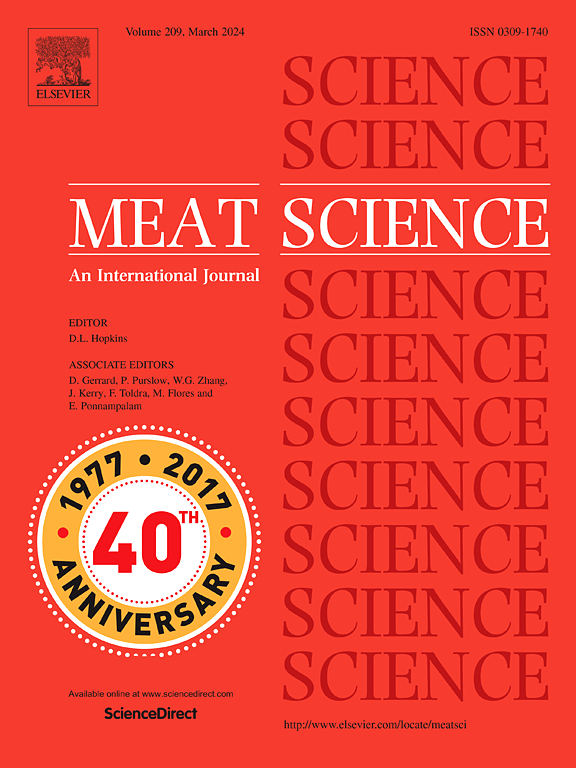利用牧草、补品和农业副产品进行可持续畜牧生产:提高生产力、增肌和肉质-综述
IF 6.1
1区 农林科学
Q1 Agricultural and Biological Sciences
引用次数: 0
摘要
由于人口增长和对动物蛋白需求的增加,全球粮食消费量正在上升,需要可持续的畜牧生产系统。本文探讨了通过利用低价值饲料、农业副产品和创新补充剂来解决肉类生产效率低下问题的策略,包括高资源利用和环境影响。我们进行了全面的文献综述,综合了Scopus和Web of Science等数据库中的最新研究,重点关注了基于饲料的饮食、谷物补充剂、海洋衍生添加剂、农业食品副产品和微量营养素干预措施。研究结果表明,以牧草为基础的饮食可以提高反刍动物肉类中有益健康的脂肪酸,而像天冬酰胺海藻这样的海洋补充剂可以在不影响肉类安全的情况下减少甲烷排放。农业副产品,如葡萄渣和橄榄饼,改善氧化稳定性和脂肪酸谱,符合循环经济原则。矿物质和维生素的补充,包括硒和维生素E,可以增强抗氧化能力,延长肉类的保质期和零售储存质量。然而,结果取决于饲料类型、添加水平和动物种类,需要仔细管理抗营养因子以避免代谢紊乱。该综述的结论是,整合多种饲料资源,如饲料、海洋添加剂和副产品,可以增强可持续性,减少环境足迹,并改善肉类品质。根据区域饲料供应和牲畜需求,战略性地实施这些做法,对于在未来粮食系统中平衡经济可行性、生态恢复力和营养增强至关重要。本文章由计算机程序翻译,如有差异,请以英文原文为准。
Sustainable livestock production by utilising forages, supplements, and agricultural by-products: Enhancing productivity, muscle gain, and meat quality – A review
Global food consumption is rising due to population growth and increased demand for animal protein, necessitating sustainable livestock production systems. This paper examines strategies to address inefficiencies in meat production, including high resource use and environmental impacts, by utilising low-value feedstuffs, agricultural by-products, and innovative supplements. A comprehensive literature review was conducted, synthesising recent research from databases such as Scopus and Web of Science, focusing on forage-based diets, grain supplements, marine-derived additives, agrifood by-products, and micronutrient interventions. Findings reveal that forage-based diets enhance health-enhancing fatty acids in ruminant meat, while marine supplements like Asparagopsis seaweed may reduce methane emissions without compromising meat safety. Agricultural by-products, such as grape pomace and olive cake, improve oxidative stability and fatty acid profiles, aligning with circular economy principles. Mineral and vitamin supplementation, including selenium and vitamin E, boosts antioxidative capacity, extending meat shelf life and retail storage quality. However, outcomes depend on feed type, inclusion levels, and animal species, with antinutritional factors requiring careful management to avoid metabolic disorders. The review concludes that integrating diverse feed resources, such as forages, marine additives, and by-products, can enhance sustainability, reduce environmental footprints, and improve meat quality. Strategic implementation of these practices, tailored to regional feed availability and livestock needs, is critical for balancing economic viability, ecological resilience, and nutritional enhancement in future food systems.
求助全文
通过发布文献求助,成功后即可免费获取论文全文。
去求助
来源期刊

Meat Science
工程技术-食品科技
CiteScore
12.60
自引率
9.90%
发文量
282
审稿时长
60 days
期刊介绍:
The aim of Meat Science is to serve as a suitable platform for the dissemination of interdisciplinary and international knowledge on all factors influencing the properties of meat. While the journal primarily focuses on the flesh of mammals, contributions related to poultry will be considered if they enhance the overall understanding of the relationship between muscle nature and meat quality post mortem. Additionally, papers on large birds (e.g., emus, ostriches) as well as wild-captured mammals and crocodiles will be welcomed.
 求助内容:
求助内容: 应助结果提醒方式:
应助结果提醒方式:


